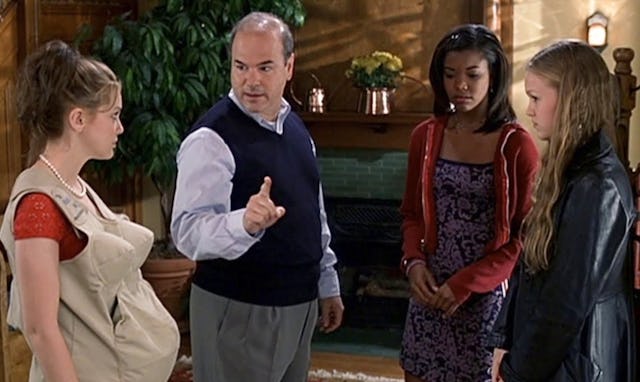What 10 Things I Hate About You Gets Wrong About Parenting
Rewatching this ‘90s classic as a mom made me take note of what *not* to do.

There are a lot of great things to love about the ‘90s: the music, the fashion, all things Lisa Frank. Then, of course, there was the rise of many beloved romantic comedies that remain popular to this day. This indubitably includes the 1999 film 10 Things I Hate About You, which celebrates its 25th anniversary on March 31. (Anyone else feeling super old, btw?) It serves as a modern-day version of William Shakespeare’s The Taming of the Shrew and centers around a group of teenagers who face their biggest challenge yet: high school.
Between the epic one-liners and that Heath Ledger serenade scene, this quickly became one of my go-to movies throughout a huge chunk of my adolescence. (I even performed Kat Stratford’s ending monologue for my high school theater class. Yes, I was that cool!) In short, I’ve watched this ‘90s classic more times than I can count. However, after a recent rewatch — something I hadn’t done/had time for since becoming a mother — I was struck by the terrible parenting tactics featured throughout the film.
In fact, it’s downright impossible to find a good adult role model anywhere throughout the story.
Daddy Issues
First and foremost, let's discuss the glaring flaws in the parenting style of Kat (Julia Stiles) and Bianca's (Larisa Oleynik) father, Walter Stratford (Larry Miller). He is the only parental figure showcased throughout the entire film, and yet his tactics are borderline reprehensible.
You see, he's an obstetrician who has witnessed many young girls become pregnant. Because of this, he's become overprotective of his teenage daughters, fearing they will share the same fate if they go out on dates with boys. To help prevent such a fate for his daughters, he establishes a house rule that neither of them can date while under his roof. Because if you don't go on dates, you can't get pregnant.
Talk about extremely problematic!
It sends the message to his girls that he has zero trust in their judgment and ability to decide things for themselves. Rather than sitting down and discussing the risks of teenage pregnancy, he simply asserts complete control over their dating life. In fact, according to psychologist Emily R. Kline, Ph.D., as per Psychology Today, "Insisting on control over adolescents' behavior drains warmth and authenticity from the relationship, and they will often find a way to circumvent parents' rules, or simply withdraw emotionally."
In other words, demanding that a teenager not do something will make them want to do it all the more, which is the exact opposite of what you want. Plus, it could severely impact your relationship with your kid. If they know that you don't trust or respect them, then they'll probably start to feel the same way about you. Remember, this relationship is a two-way street.
The Sibling Rivalry Factor
Mr. Stratford ultimately comes up with the idea that instead of preventing his daughters from dating outright, he establishes a new rule: Bianca can date if — and only if — Kat starts dating. And since Kat never seems to want to go out on dates, that means Bianca will never date.
Once again, this is a terrible precedent to set since it pins all of the responsibility and blame on the eldest sibling, which is pretty much guaranteed to cause resentment between the two of them. That isn't fair to Kat or Bianca. The hope for many parents is that siblings will grow up to love and rely on each other for support. Pitting them against each other tends to set them up for failure on that front.
Naturally, I'm aware that this is all just a fun movie, and Mr. Stratford's role in it is supposedly to be purely comical. And it is — so long as you interpret it that way. Because while his remarks are undeniably entertaining ("My insurance does not cover PMS"), his actions shouldn't serve as a guide to parenting in any way, shape, or form.